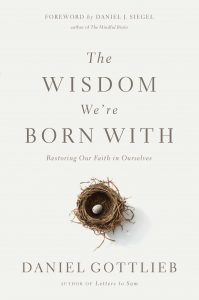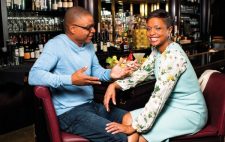If you ask Dr. Dan Gottlieb what he does for a living, he will say, “I teach kindness.” For almost 30 years, the psychologist has hosted the call-in radio show “Voices in the Family,” where he discusses mental health issues, often using his own experiences of loss and tragedy to help others. The author of four books, Gottlieb released his most recent, “The Wisdom We’re Born With” last month, donating his royalties to a school for disabled children in South Africa. Gottlieb has chosen an excerpt from his new book for SJ readers.
 In nineteen classrooms of fourth- and fifth-graders in Vancouver, Canada, schoolchildren were given very interesting (nonacademic) extracurricular assignments. Some of the students were asked to make special visits, three times a week, to places of their own choosing – say, a mall, a park, or someone’s house. Another group had different assignments: their tasks involved simple acts of kindness – giving a parent a hug, helping to vacuum the house, or sharing lunch with a fellow classmate. (Of course, the whole experiment was conducted with the prior consent of their parents and the children themselves.) The children’s attitudes and behaviors were measured by researchers both before the experiment began and then four weeks later, after the kids in the two groups had completed their assignments.
In nineteen classrooms of fourth- and fifth-graders in Vancouver, Canada, schoolchildren were given very interesting (nonacademic) extracurricular assignments. Some of the students were asked to make special visits, three times a week, to places of their own choosing – say, a mall, a park, or someone’s house. Another group had different assignments: their tasks involved simple acts of kindness – giving a parent a hug, helping to vacuum the house, or sharing lunch with a fellow classmate. (Of course, the whole experiment was conducted with the prior consent of their parents and the children themselves.) The children’s attitudes and behaviors were measured by researchers both before the experiment began and then four weeks later, after the kids in the two groups had completed their assignments.
The results? All the children who had the “kindness” assignments had a stronger sense of well-being and, in addition, were much more likely to be accepting of their peers. The acts of kindness, though unrelated to classroom activities, opened doors to establishing friendships. As noted by one of the psychologists who helped develop the experiment, assigning the adolescents to perform acts of kindness outside the classroom proved to be an avenue that could lead to a decrease in bullying and increased empathy and caring for others.
Throughout our lives we are destined to make our own journeys in search of a sense of well-being. Many of us pursue wealth or fame or personal accomplishment, but once those are achieved, something always seems to be missing. The pursuit of happiness is a popular topic in the lay press these days. But once achieved, happiness can be fleeting. Or as one Buddhist author said, “After enlightenment, take out the trash.”
Ultimately, we want well-being, a kind of wellness that begins deep inside. Those children in the Vancouver classrooms have perhaps discovered something about the search that they didn’t know before – that acts of kindness are in a different category from the many other actions kids of that age are likely to perform. An act of kindness has greater influence than many other ordinary daily activities. As the study suggests – and as we know intuitively – the generous action actually alters the way we view others, interact with them, and regard them. And those who witness these acts also benefit from the exchange.
The researchers who conducted this study immediately began to think about its implications. Perhaps an increase in peer acceptance could benefit the classroom and social life. Maybe parents and teachers could “encourage these sorts of simple acts of kindness in children – or in themselves.”
But I wonder what the experiment was like for the children involved in that study and how they will remember it later on. I think all of us have discovered that when we help others, we are rewarded with a sense of well-being that defies definition. Anyone who has volunteered to help a child or an older person or has read to a class of kids knows the feeling of “I got more than I gave.” (I wrote in “Letters to Sam” how, shortly after my accident, my act of compassion for someone else – a nurse in the intensive care unit – changed my life.)
But as those kids (and all of us) get down to work in the classroom, in our jobs, or in our homes, the emphasis will be on getting, not giving. Getting better grades. Getting into the best university or getting the right job. Getting homes and clothes and cars and entertainment and vacations. Ultimately all of that “getting” is in service to finding security in our lives. And instinctively we believe that security comes with sufficient acquisition. But we are learning that that is not the case; once we have our basic needs met, acts of generosity actually increase our sense of well-being.
That’s why we are hardwired for caring and kindness. There’s a way in which we know that reaching out to others makes us feel good. We know that acts of generosity open us up to more relationships with our fellow humans. There’s a reason all the great teachers in our history – from the Buddha to Jesus to Mother Teresa to some well-known Holocaust survivors – all teach that we should be generous of spirit and generous in deed.
From the perspective of our evolutionary brain, it is only through care and cooperation that we have survived as a species. So our brains and spirits know about this.
But what happens to that knowledge? Does it go underground while we set about getting things done? Is it still accessible to us as we go on our lifelong search – the search that we all share – for a sense of well-being?
As the Vancouver schoolchildren get older and begin living their adult lives, I wonder how many will remember – either emotionally or intellectually – what they discovered about themselves when they were part of that very simple experiment. My guess is that it will be just as hard for them as it is for the rest of us, because as we move along the life cycle our focus tends to be more narrow and more about self and immediate family than about others. And of course that makes sense, because we must take care of ourselves and our families. But when life is in balance, we tend to be better off. Taking care of oneself to the exclusion of others leads to misery. Taking care of others to the exclusion of oneself is always a path to emotional malnourishment.
Most people who come to my office are struggling to be happier. They are in search of some sense of well-being that they may have never experienced but believe they can find on the outside.
But where is it? Those children in Vancouver felt a sense of well-being. When I was able to help that nurse in the intensive care unit, I experienced well-being, at least temporarily.
Well-being is a “felt sense.” It’s the feeling you have when you feel safe. It’s a body’s response to the belief that all is well in the world.
That feeling of well-being is inside of us. We have all experienced it somehow and somewhere, even if just for moments. But for many of us, it seems as though the sensation is lost or at least inaccessible.
And so we go on a mission-like search to find it again.
The Vancouver children got a taste of where well-being comes from, and with luck, that experiential memory may never leave them. But even if it does, they will always have the capacity for well-being, which only needs to be awakened.
I think the great yogic leader Shantideva got it right when he said:
Whatever joy there is in the world
Arises from wishing for others’ happiness.
Whatever suffering there is in the world
Arises from wishing for your own happiness.
My formula is a fairly simple one: If you want more love in your life, love more people more fully. If you want more well-being in your life, reach out to others and offer them kindness.
Simple acts like this can awaken wisdom that may have been with us our whole lives.
Reprinted with permission from “The Wisdom We’re Born With” © 2014 by Daniel Gottlieb, Sterling Ethos, an imprint of Sterling Publishing Co., Inc.









